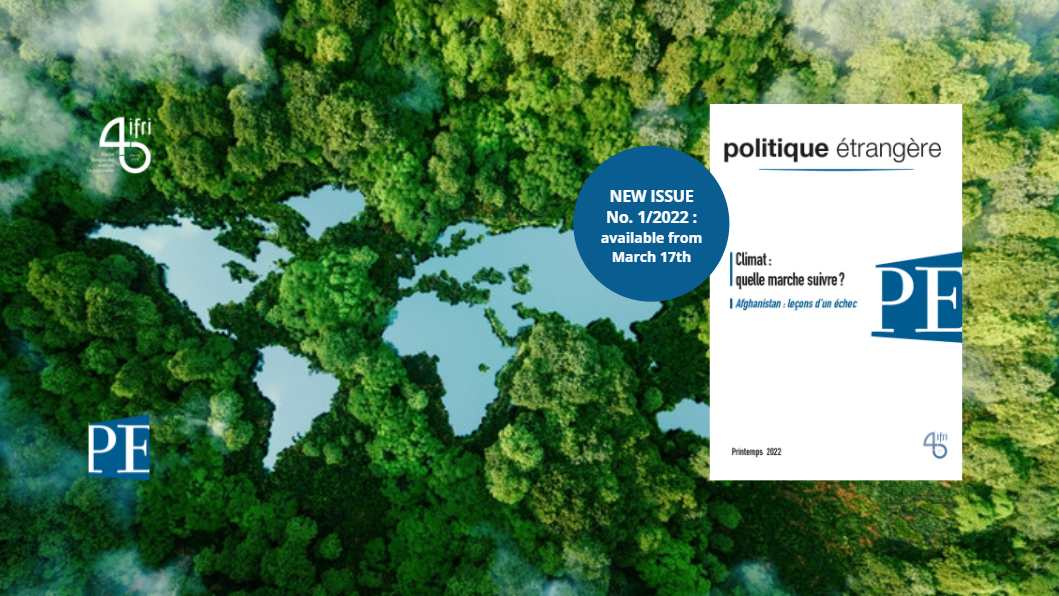Climate: Which Way Forward?
Thirty years after Rio, the case file “Climate: Which way forward?” assesses current climate commitments, which are undoubtedly less impressive and less certain than the political pronouncements and media fanfare make them seem. A number of fundamental problems remain.

The promises of the Paris Agreement are far from being fulfilled. The journey to carbon neutrality is complex and requires coordinated action from all involved, across both private and public sectors. The financing promised to poor countries has not come through—in particular for those in Africa, even though the continent is crucial for the entire energy landscape and for global development. Moreover, progress cannot be made on important climate negotiations while ignoring deteriorating relationships between global powers such as the USA and China. There is a climate emergency, but it can only be addressed within broader global geopolitical dynamics.
After Afghanistan, our Counteranalysis section asks: Must NATO’s political basis, purpose, and effectiveness be rethought? Will Russia’s current movements bring it back to its primary purpose: the defense of Europeans in Europe? And what should be done about the Americans’ barely-concealed desire to integrate NATO into a general mobilization against China? The situation might be simpler should the Europeans decide to reckon a little more closely with the risks and threats that surround them: but, ever-creative in generating security institutions that are badly deployed or never used, they remain focused on what divides them. Afghanistan, China, Russia, the Sahel: Will current events provide conclusive arguments?
This issue is available in French only.
CLIMATE: WHICH WAY FORWARD?
Case file directed by Marc-Antoine Eyl-Mazzega and Carole Mathieu
Introduction: An Assessment of COP26, by Carole Mathieu
What Progress on the Paris Agreement on Climate Change?, by Christian de Perthuis (in French only - Où en est l'Accord de Paris sur le climat ?)
How Can Carbon Neutrality be Reached?, by Pierre-Frank Chevet, Guy Maisonnier and François Kalaydjian
Climate Finance for Africa: Burden or Opportunity?, by Jean-Michel Severino
Sino-American Climate Diplomacy, by Kevin Tu (read the article)
AFGHANISTAN: LESSONS FROM FAILURE
NATO in Afghanistan: What Can We Learn?, by Jean-François Bureau
Can the EU Develop its Own Means of Power?, by Tara Varma
CURRENT AFFAIRS
Ethiopia: Civil War Dynamics, by Sonia Le Gouriellec (in French only - Éthiopie : dynamiques de la guerre civile)
Iraq: Unmanageable Diversity, by Adel Bakawan
Boris Johnson: From the Capitoline Hill to the Tarpeian Rock?, by Marie-Claire Considère-Charon
BAROMETERS
A Year on from the Coup: Burma Collapses, by Sophie Boisseau du Rocher
Iran’s Economic Strategy: Between Collapse and Opening Up, by Matthieu Etourneau and Clément Therme
The Worldwide Drug Trade: Another Globalization, by Cyrille P. Coutansais
REFLECTIONS
Europe: Confronting Real Threats, by Anatol Lieven
BOOK REVIEWS
Edited by Marc Hecker
La (re)localisation du monde, by Cyrille P. Coutansais
Crises épidémiques et mondialisation. Des liaisons dangereuses ?, by Gilles Dufrénot and Anne Levasseur-Franceschi
Trade in the 21st Century: Back to the Past?, by Bernard M. Hoekman and Ernesto Zedillo (ed.)
Demain la planète. Quatre scénarios de déglobalisation, by Xavier Ricard Lanata
This review essay is written by Norbert Gaillard
Download the full analysis
This page contains only a summary of our work. If you would like to have access to all the information from our research on the subject, you can download the full version in PDF format.
Climate: Which Way Forward?






